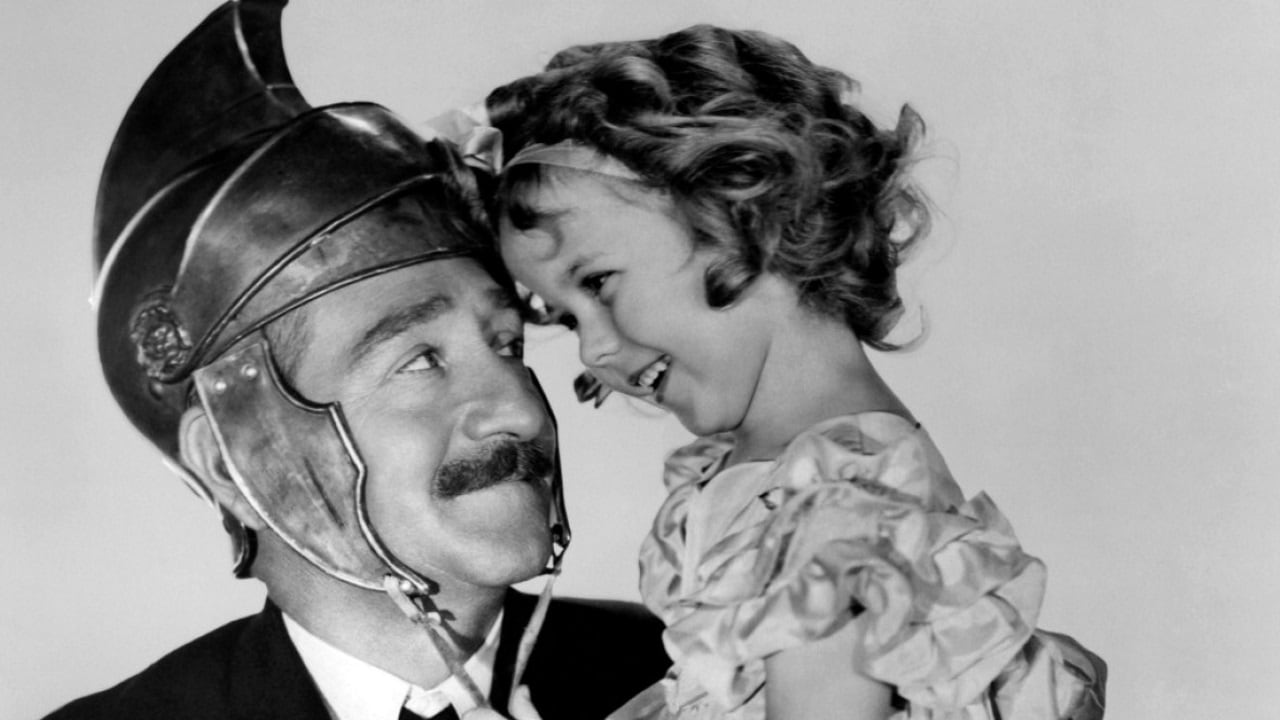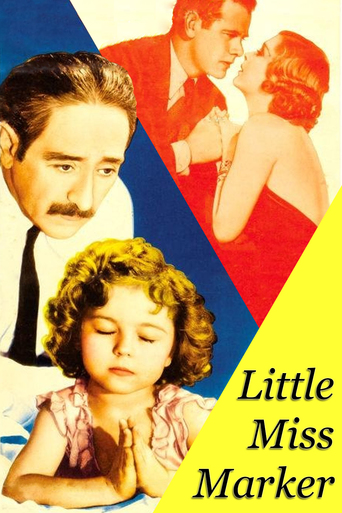

Memorable, crazy movie
... View MoreExactly the movie you think it is, but not the movie you want it to be.
... View MoreAmazing worth wacthing. So good. Biased but well made with many good points.
... View MoreThere are moments that feel comical, some horrific, and some downright inspiring but the tonal shifts hardly matter as the end results come to a film that's perfect for this time.
... View MoreCopyright 31 May 1934 by Paramount Productions, Inc. New York opening at the Paramount, 18 May 1934. Sydney opening at the Prince Edward (on a double bill with the W. C. Fields comedy The Old- Fashioned Way), 13 October 1934 (ran 3 weeks). 9 reels. 80 minutes. U.K. release title: GIRL IN PAWN.SYNOPSIS: Man leaves his daughter as a deposit with a bookmaker. NOTES: Academy Award to Shirley Temple, best juvenile performer of 1934. Re-made as Sorrowful Jones (1949): 40 Pounds of trouble (1963); and again as Little Miss Marker (1980).COMMENT: Despite the fact that the title role is enacted by the one and only Shirley Temple, "Little Miss Marker" is actually a Dorothy Dell vehicle. Shirley gets to sing only one song ("Laugh, You Son- of-a-Gun") — and that in tandem with Miss Dell who also has two solos ("Black Sheep Blues" and "Low-Down Lullaby"). The musical program is rounded out by Lynne Overman and chorus rendering "East Side, West Side, Sidewalks of New York" and "The Bowery". Miss Dell is a very able actress — and a most accomplished singer — but you are excused if you don't recognize her. She had previously starred in "Wharf Angel" and after this film made "Shoot the Works". Before the latter film was released, she was killed in a car accident.Unfortunately, despite the skill of Miss Dell and the obvious charm of Miss Temple, this first version of "Little Miss Marker" doesn't really stand up to any of its re-makes. The fault can be proportioned equally among the scriptwriters, the director, and the rest of the players. Too much dialogue, too slow a pace, too little dramatic tension (despite a few promises and hints now and then).As a result, the film lacks punch, sharpness, contrast. The characters are all too wishy-washy. We are never led to believe for one moment that Menjou is as mean as he says he is, or that Bickford (for all his customary blustering) as tough. In fact, most of the players seem miscast as Runyonesque types. Warren Hymer and John Kelly overact atrociously. However, the movie is reasonably attractive to look at, even if its lighting, costuming and staging are somewhat bland.
... View MoreDamon Runyon's story about a girl left as a pawn with a bunch of racetrack characters has a certain flavor about it that many find appealing, but frankly the only reason I showed any particular interest in this film is the remarkable presence of little SHIRLEY TEMPLE in the title role.With the influence of tough-talking gents and gals around her, she soon adopts street-wise ways and manners of speech, so it's not the usual soft and sweet Shirley that we get here. Nevertheless, she remains adorable throughout, speaking all of her lines with the kind of verve and personality that would soon make her the number one box office attraction during the Depression years.It's worth noting that ADOLPHE MENJOU (who called her a little Ethel Barrymore) has some of his best scenes opposite Temple. She manages to hold her own against him, but he's well cast as the shady character with the sad eyes and droopy mustache who'd rather be romancing DOROTHY DELL than taking care of a pint-sized doll.Incidentally, DOROTHY DELL died in an auto accident within days of the film's release. She showed promise of becoming a very good actress in all of her scenes with Shirley and Menjou.
... View MoreLITTLE MISS MARKER (Paramount, 1934), directed by Alexander Hall, from the story by Damon Runyon, became the studio's answer to Columbia's successful Runyon tale, LADY FOR A DAY (1933). In true Runyon tradition, it consists of many character types with odd-ball names, including wrestlers Sore Toe (Warren Hymer) and Canvas Back (John Kelly); dishonest Bennie the Gouge (Sam Hardy), drunken Regret (Lynne Overman), good-natured Doc Chesley (Frank McGlynn Sr.), and the title character of "Little Miss Marker" going to 6-year-old Shirley Temple, on a loan-out assignment from Fox Studios, ranking one of the finer films she made during her busiest year (1934)in the movies.Plot summary: Big Steve Halloway (Charles Bickford), gambler, gang leader and proprietor of New York's Horseshoe Cabaret, where his girl, Bangles Carson (Dorothy Dell) sings, is in desperate need of money. He arranges for his fellow bookies, especially Sorrowful Jones (Adolphe Menjou), to each pay him $1,000 each for his racehorse, Dream Prince, to lose. With all bets being placed at the window, Sorrowful encounters a gambler (Edward Earle), having lost $500, wanting to place his bet but is unable to come up with $20. Instead, he places his daughter, Marthy Jane (Shirley Temple), as security, or in bookie's terms, a "marker." While Sorrowful refuses to accept 'markers," he does so with this one, having the child to wait outside his office until Daddy returns. Having lost his bet, he commits suicide, leaving "little Miss Marker" under the care of Sorrowful Jones. As Steve hides out in Chicago to avoid investigation for his crooked bets, he entrusts Sorrowful to watch over Bangles during his absence, at which time the "gold digger" helps "tight-wod" with his "40 pounds of trouble." When Big Steve learns Bangles is involved with Sorrowful, he takes his "rod," returns to New York to do something about it.The supporting players: Adolphe Menjou is perfectly cast as Sorrowful Jones, resembling that of a cartoon character down to his sad-eyed face and droopy mustache. He and Temple work remarkably well together, sharing great scenes, especially the highlight where Sorrowful teaches "Markey" how to pray. It is Menjou, not Temple, who closes this with a comedy line. Unlike her future film assignments, LITTLE MISS MARKER offers Temple a rare opportunity to play a fresh kid later on in the story, thanks to the bad influence of Sorrowful's friends. Dorothy Dell's Bangles is the one who makes every effort to restore Markey's child-like innocence by having the gang gather together in Steve's night club to re-enact her favorite bedtime story of "King Arthur and his Knights of the Round Table" with Sorrowful playing Sir Galahad, and Bangles as Lady Guinevere, along with the opportunity to ride her horse known as "The Charger." Charles Bickford, a fine actor with a rough exterior, plays a tough mug whose very presence and gruff sounding voice causes the Charger to jump about in fear, an idea duplicated in the Marx Brothers comedy, A DAY AT THE RACES (MGM, 1937), with Douglass Dumbrille as the villain whose harsh voice causes the star racehorse to run amok.While many will comment on Shirley Temple's performance, one cannot help but notice the unfamiliar name of Dorothy Dell in the cast. Who is Dorothy Dell? It's surprising to learn that during the making of LITTLE MISS MARKER, she was a 19-year-old newcomer (who looked older than 25) with only two other 1934 releases to her credit: THE WHARF ANGEL and SHOOT THE WORKS. By the time LITTLE MISS MARKER was released, Dorothy Dell was dead, a victim of an serious automobile crash. Looking over her style, she had the mannerisms of a young 20th-Fox's own Alice Faye, blonde, deep-throat singer, tough exterior but soft in heart. Due to the availability of LITTLE MISS MARKER will Dorothy Dell's name be virtually a curiosity today. Dell takes part in much of the song numbers composed by Ralph Rainger and Leo Robin including: "I'm a Black Sheep Who is Blue" where she vocalizes in the night club, and "Low-Down Lullaby" singing Markie to sleep. She and Temple team up with on the piano with "Laugh, You Son-of-a-Gun," the latter obviously a hit tune since it's instrumentally used for opening or closing to other Paramount films, namely Temple's upcoming Paramount project NOW AND FOREVER.Aside from frequent commercial television revivals prior to 1989, LITTLE MISS MARKER surfaced on numerous cable stations in later years, including the Disney Channel (1990s); American Movie Classics (1991-92) and Turner Classic Movies (2003-04). Unlike its presentations on either AMC and TCM, LITTLE MISS MARKER's availability on both VHS (1996) and DVD formats are colorized. LITTLE MISS MARKER consists of such notable remakes as SORROWFUL JONES (Paramount, 1949) with Bob Hope, Lucille Ball and Mary Jane Saunders; FORTY POUNDS OF TROUBLE (Universal, 1963) with Tony Curtis; and 1980 under the original title starring Walter Matthau and Julie Andrews, but very few child actresses could compare to the likes of the original Little Miss Marker herself. (****)
... View MoreBoth win. Of course, having Adolph Menjou on hand doesn't hurt. Temple is ideally cast as waif left as market for gambling debt. Menjou is classic as bookie who doesn't know what to do with his collateral. It is a fast moving romp, with a great and unforgettable supporting cast.
... View More